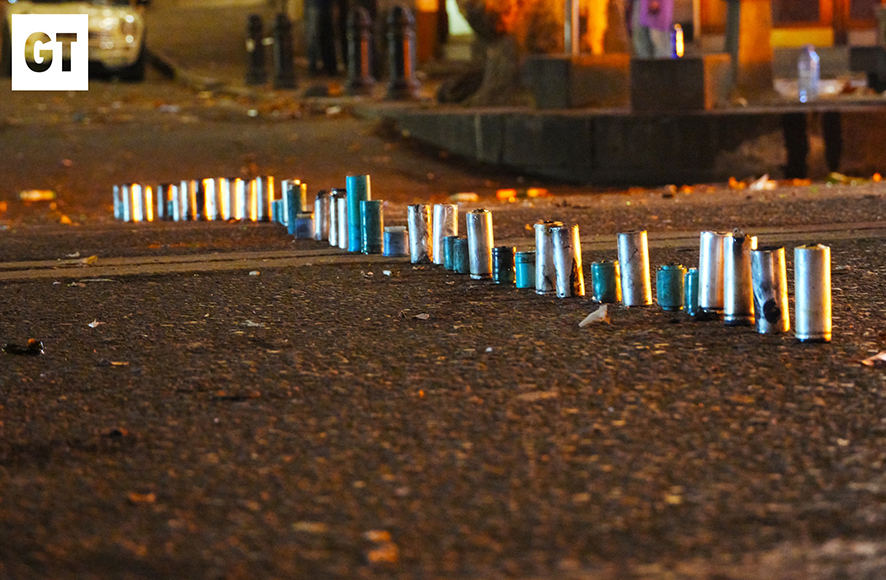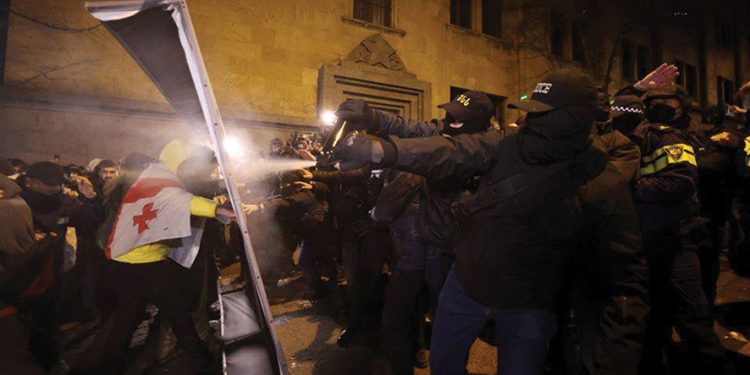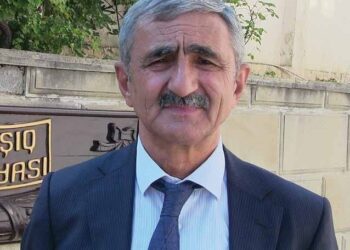In the past week, Georgia has witnessed escalating violence during countrywide protests against the government’s controversial policies. What began as peaceful demonstrations in Tbilisi quickly turned into scenes of chaos, as riot police and special forces deployed brutal tactics to disperse protestors. The violence has sparked both nationwide and international outrage, drawing attention to the alarming pattern of police brutality, particularly against those exercising their fundamental right to peaceful assembly.
Between November 18 and 29, a delegation from the Council of Europe’s Committee for the Prevention of Torture (CPT) visited Georgia to assess the country’s treatment of detainees. The CPT’s focus included police custody conditions, the safety of prisoners, and the treatment of those detained during ongoing demonstrations in Tbilisi. The delegation’s findings will undoubtedly play a crucial role in the ongoing scrutiny of Georgia’s law enforcement practices, especially regarding the violent repression of protests.

Brutal Crackdown on Protesters
The nightly protests in Georgia began as a reaction to last week’s governmental decision to delay accession negotiations with the European Union, following on from weeks of protest against the “illegitimate elections,” moves widely seen as a shift away from European values and a potential alignment with Russian interests. Demonstrators, including thousands of ordinary Georgians, opposition politicians, and human rights advocates of all ages, gathered on Rustaveli Avenue in Tbilisi to voice their dissatisfaction with the Georgian Dream ruling party and to demand the country’s continued path toward European integration.
However, the protests soon became a hotspot for police violence. Special forces and riot police have been using water cannons, pepper spray, and tear gas against peaceful protesters, escalating tensions and provoking outrage both domestically and internationally. Despite the protesters’ largely non-violent stance, seeing only a small group of youth reacting with violent tendencies (shooting fireworks, throwing objects and vandalizing public property to build barriers in the street), police forces have repeatedly retaliated with increasingly aggressive tactics, including the use of tear gas and chemical-mix water jets aimed at individuals.

The use of chemical irritants like tear gas and pepper spray in particular has been widely criticized for being disproportionate and indiscriminate. UN Special Rapporteur Gina Romero highlighted the risk of serious injury and even death caused by these weapons, particularly when used in violation of international standards, which clearly state that less-lethal weapons should only be used as a last resort.
On December 2, Police Chief Vazha Siradze claimed that the police were using “proportional force” against the demonstrators. Yet numerous reports from detainees and medical professionals tell a different story. According to the Georgian Public Defender Levan Ioseliani, of the 156 detainees he visited at the beginning of the week, 124—roughly 80%—claimed they had been subjected to violence and inhumane treatment. Ioseliani described this as “a very disturbing number,” noting that the percentage of individuals claiming police abuse was rising alarmingly with each successive protest. “This is a very worrying indicator,” he said, urging the police to adhere strictly to legal norms and use only legitimate force.

Youth and journalists have also fallen victim to police violence, with a disturbing video circulating this week showing a young teen being kicked in the face by two police officers, despite already being on the ground and defenseless. A 22-year-old remains in hospital in a coma. On Tuesday, mothers across the country gathered outside police stations in a display of solidarity, calling on police officers to stand with the people, urging them to uphold their oath to serve and protect citizens, rather than perpetuating violence and injustice.
Several Georgian journalists have also been injured during the dispersal of protests on Rustaveli Avenue. Aleksandre Keshelashvili, a journalist from the online news outlet Publika, was detained while reporting on the protest. According to Publika, Keshelashvili was subjected to excessive force during his detention.
Ioseliani and his team from the Public Defender’s Office continue their work, visiting detainees in isolation cells across the country to ensure their rights are respected. Ioseliani emphasized the importance of the Special Investigation Service taking strict action in response to violations as part of a broader push for justice.

A PATH FORWARD: ACCOUNTABILITY AND REFORM
As the violence continues to unfold, international bodies have also raised alarms over the Georgian government’s handling of the public protests. The Office for Democratic Institutions and Human Rights (ODIHR) expressed concern about the excessive use of force by the police, urging Georgian authorities to facilitate peaceful gatherings and engage in non-violent dialogue.
In the face of growing public outcry and international condemnation, the Georgian government must take immediate steps to address the issue of police brutality and ensure the protection of fundamental rights. This includes holding law enforcement officers accountable for their actions, especially those who have violated the rights of protesters, journalists, and bystanders.
Mid-week, a long list of offending police officers was released, along with photos taken from social media. Many of those men have since deleted their accounts for fear of repercussions.
The CPT’s visit to Georgia provides a critical opportunity to review the country’s progress in addressing these human rights concerns. However, it is clear that without a commitment to meaningful reform, including improved police training, better safeguards for detainees, and a restoration of trust between the government and the people, Georgia risks deepening its political and social crisis.

As the protesters continue to demand justice, they are not only fighting for their right to free speech but for the soul of their nation. Georgia’s future—one aligned with European democratic values—depends on the government’s willingness to uphold the principles of freedom, justice, and accountability. The eyes of the international community are now firmly fixed on Tbilisi, watching whether the Georgian government will heed the call for reform or continue its descent into authoritarianism.
By Team GT














